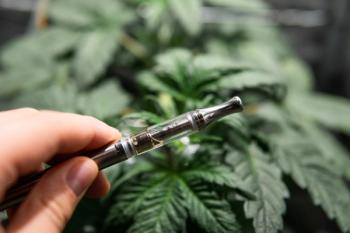
A New Technology Offers a Solventless Alternative for Efficient Extraction: An Interview with Jaqueline McGrane of Boulder Creek Technologies, Part I

In part I of this interview, Jaqueline McGrane, Senior Vice President of Business Development at Boulder Creek Technologies, gives an in-depth description of the unique functionality of their extraction system and the advantages it provides to clients in terms of efficacy, quality, and safety.
Based in Colorado, Boulder Creek Technologies (BCT) recently introduced a new extraction system to the cannabis industry that offers a solventless alternative to current technologies. In part I of this interview, Jaqueline McGrane, Senior Vice President of Business Development at BCT, gives an in-depth description of the unique functionality of their extraction system and the advantages it provides to clients in terms of efficacy, quality, and safety.
Can you tell us about your position at Boulder Creek Technologies (BCT)?
Jacqueline McGrane:I am the Senior Vice President of Business Development for Boulder Creek Technologies. BCT is a startup, so we all wear a lot of hats, but as a senior vice president, I do a lot of connections with my network of people in the cannabis industry, educating people on the Vapor-Static™ System and its applications to the industry. I do a lot of the science as well, because my background is in biology and organic chemistry.
What experience do you have in the cannabis industry?
McGrane: I've been in the cannabis industry for over a decade. I started in Colorado before Amendment 64 (the legalization of adult use cannabis). I ran a company called Herbal Sacrament that made butane hash oil (BHO) products, and then I ran a couple of MIP facilities and then started a consulting company.
I've designed facilities domestically and internationally for processing of cannabis and hemp material into end products. My specialty is in extraction. I joined BCT a little more than a year and a quarter ago and I've been with them ever since.
What are the main objectives of BCT?
McGrane: Our main ethos is to bring safe, efficient, solventless processing mechanisms to processing systems to the cannabis and hemp market. The basic objective is creating sustainable systems that are very efficient at producing high quality products for the consumer and patients. One of our biggest challenges in the cannabis and hemp market is sustainability. We're using lots of solvents, we're using a lot of power requirements, and we need huge amounts of labor to take this plant material and turn it into the final products that consumers and patients are using.
It's one of the things that I personally have dealt with throughout my entire experience in the industry. BCT was founded on an ethos of bringing techniques that don't involve flammable solvents or batch methodologies. The other big ethos is that all our processing systems are continuous processing systems, which creates a large amount of efficiency.
You mentioned BCT is a startup. Are you only in Colorado right now or have you expanded to other states?
McGrane: BCT has actually been in existence for almost three years now. We started with the prototyping the system, the Vapor-Static technology, as well as a second system that is a medium chain triglyceride (MCT) oil extractor. It's a solventless semi continuous MCT oil extractor. BCT started with producing that device and selling it, and then they prototyped the Vapor-Static system, optimized it, and ran it through its paces for a long time. After we were able to get to a point of being able to produce a production system, we released it to the public at MJBizCon. That was our first release of the Vapor-Static to the wider cannabis industry.
We have units in production right now. Our first unit was our largest one—a 5000 pound/day extractor—and it's currently operating with a client in Oregon who is running cannabis material at very high volumes. That just goes to show the capabilities of Vapor-Static: we can produce a solventless device that can run 5000 pounds a day.
We currently have another VS 5000 Extractor that is being delivered to a client in Utah at the beginning of July, a VS 1000 Extractor heading to Hawaii after that, and several more VS 1000 systems in various stages of sales and production. We're also just about to close a deal with a company that's associated with a large university in the United States. There's a lot of different sales coming up and production systems that will be going out over the next several months to multiple states. And then probably within 8 months, we'll start getting off into the international market.
Can you tell us more about the partnerships you have been forming?
McGrane: Yeah, I can give you a brief description of some of the partnerships that we have. We are developing a very deep relationship with Maratek. Maratek is a company from Toronto, Canada and is a major large scale fabricator engineering firm. They had been producing ethanol systems and were interested in working with us because of how efficient the solventless system is.
Right now, we're going to be announcing at NoCo a major partnership with them to continue to work with us. They’re a distributor of our equipment as well as now a fabricator of it. With Maratek on board now as both a fabricator and a distributor, our production has become much more efficient and has opened up more opportunities for sales in Canada and internationally.
We also have a distribution relationship with Agrify, and they have been an amazing partner and are incredibly excited about what this system can do in the market.
What are some of the achievements you've been involved in with BCT and what projects are you working on now?
McGrane: Basically, our main goal over the last year has been getting the pilot Vapor-Static system to the point of being a production device and to be something that we can sell. That was a huge step forward. We were optimizing and running, modifying, and improving the prototype device for a very long time. Because it's a new technology, we wanted to absolutely ensure that our system was ready for prime time. We all know in this industry there's a lot of companies that bring in new tech that's not very well tested and ends up causing problems.
Down the line, there's further development of the system. Right now, the system will take ground, dried biomass and produce an oil that you can put straight into a distillation system in the future. We want to be able to take wet biomass and output distillate, which is totally feasible with our platform.
In the future, the end goal of the Vapor-Static system is to have biomass pretty much straight-off-the-farm wet on the other side of the machine, and a continuous process pumping out distillate that's ready for the consumer, all in a solventless and continuous methodology.
We spent over a year bringing the pilot and production systems to the point of being a production system. That was a huge milestone that we achieved this year. And then the public release at MJBizCon was great. I've been at every MJBizCon since it was at the Rio, and this was probably the most interest that I've seen in a system ever.
Another big milestone recently has been getting that first production system operational at a huge scale at our client's facility in Oregon. I just got some great client testimonials about that. They say that they're super excited to be part of the innovation we're bringing to the market.
Our support has been incredible, which means a lot to us. As a company that's bringing a new technology to the market, we want to be known for providing great support and ensuring our customers’ success. So, to get that kind of feedback has been really great.
Building on these sales across the nation, the next big steps are to get out into the international market, which involves some modifications. You've got to meet different requirements in Europe than you do in the United States. That'll be the next step for development of the system, then mass fabrication. With our new relationship that we're going to be announcing soon with Meritech we’ll be able to have a major large-scale fabricator behind us building these systems en masse. It’s actually a huge achievement for us and we're really happy about that.
We've also been hiring a lot of people like myself. I have a major social media following. A lot of the team members that we brought on over the last year have been huge. We have such a great team here. We brought on people like Matthew Broxterman, our Sales Director and Levi Wells, our Director of Engineering. The founders, Rick and Steve Bonde, are amazing guys. Now we have a whole crew of people working in BCT. We've expanded quite a lot and we have further expansion coming up.
Could you tell us more about the research and development happening with your plans for the future?
McGrane: We have in-house analytics and I actually run the high-performance liquid chromatography (HPLC) for testing in-house, so we can do that really efficiently. We have our test bed system in Arvada, Colorado that we’re running almost every day to try to improve various components, to improve ease of manufacturing, to optimize further, and add on different modules so that we can take those next steps.
We're continuously doing research and development as one of our major focuses and then also putting a lot of effort into our customer development and customer service. That's going to be a big part of the next several months as we start to get a lot more of these systems out into the hands of customers.
What changes do you see happening in terms of cannabis production in the next few years?
McGrane: The fact is, how we produce cannabis products today is so inefficient. With an ethanol processing line, for example, you have cryocoolers to chill your solvent down, then you have centrifugal extractors, then you have filtration modules, and then you have falling-film evaporators (FFEs) to recover it. Then you have a decarboxylation and degassing system and then you go to distillation.
Each one of these steps is a batch methodology. Each one of those steps requires a person or multiple people to operate it. Then, running it through a solvent, you're going to lose a lot of hydrocarbons and ethanol into the atmosphere. It's not a very sustainable way to do things and it also creates high prices. It reduces accessibility because all this cost is added on.
Then, of course, you have safety concerns. We all know about people blowing up their houses or facilities with BHO and ethanol. Now, don't get me wrong, I did BHO for a long time. There are ways to do it safe, and most people do it safe, but there's always that risk. There’s also all the cost involved in in housing this equipment if you're running a hydrocarbon production facility. You're spending potentially hundreds of thousands of dollars on Class I, Division 1 (C1D1) infrastructure, sprinkler CO2 fire suppression systems, ventilation, exhaust, air conditioning and other equipment as well as the space to house it all.
There's so much infrastructure required that it just creates such an inefficient way to do things. It also creates high product prices and it's not a sustainable methodology. Vapor-Static solves pretty much every one of those issues, and that's why I'm excited. Over 10 years, I've seen a lot of new stuff, and I have never seen anything with the potential like that of BCT in Vapor-Static technology to disrupt, change, and bring innovation to this market.
Vapor-Static technology allows continuous process. It replaces four or five systems that require multiple individual systems all housed in this C1D2 or C1D1 infrastructure and requiring many individual laborers to operate.With Vapor-Static technologya single person operating a continuous device in a regular building that doesn't require any sort of additional infrastructure for safety, plus you're not losing solvents to the atmosphere.
You don't have safety concerns in terms of the potential risk of fire and explosion and you have a very high quality product that comes out. The Vapor-Static concentrate that comes out of our system is substantially higher quality than an ethanol oil. You end up with a product that's much easier to process into the end products for consumers.
You can take the Vapor-Static concentrate and put it straight into edible products right there. You can also run it through distillation right away to get to distillate products that are solvent-less and have increased accessibility of the market so you can reduce prices. You can have high quality product that is a fraction of the cost that you see today instead of spending $50 or $60 on a on a vape card, people will be able to spend a half of that, or a quarter of that. You could reduce prices so much with our technology.
Finally, we’re introducing some real sustainability to the market. Once cannabis becomes federally legalized, and it will, the Environmental Protection Agency (EPA) is going to start being much more involved. I think they already see what's going on in the industry and are not very happy with it.
Our technology could be designated a Best Available Technology by the EPA or other federal regulatory agencies because of how efficient, safe, and sustainable it is. Moving forward, we hope to help facilitate the nationalization of the cannabis market by having this technology be something that regulatory agencies look very favorably upon and have it be something that, from a production standpoint, you just need to have. If you're trying to create high quality products using these older methodologies that require such high cost, you just won't be able to compete, in my opinion.
It's also very important to consider neutral cannabinoids versus acidic. The effect of BCT and Vapor-Static on the market is going to be for neutral cannabinoids. I specifically joined BCT and I believe in BCT because it brings this new technology to the market that could really revolutionize the production of neutral cannabinoids. In terms of other systems, other methodologies, to create dabbable products and other such products can actually be complementary.
Let's say you had a BHO system and you're running live resin. When you run live resin, you're not getting a very high extraction efficiency and it’s due to the fact that you're freezing the biomass material. There's a lot of cannabinoids in cell structure. Right now, we just throw them away, but you can actually take that post-extraction stuff, run it through the Vapor-Static system, and recover those cannabinoids. The Vapor-Static can increase and complement acidic methodologies like rosin production and BHO production, and it can completely replace neutral production systems like ethanol and CO2.
That's why I joined BCT. This is going to truly change the industry. And I haven't believed in a new technology in 10 years of being in this industry as much as I believe in Vapor-Static.
Is the Best Available Technology (BAT) designation something you can petition for now or do you have to wait for the EPA and other federal agencies to become involved?
McGrane: All cannabis processing is basically regulated on a state level. With these individual states, we can have good relationships with regulatory agencies. The fire department is a great example. When we had the fire department inspect our system, they were so happy because they realized it wasn't going to be a huge issue. With BCT, because we don't have super high pressures or flammable solvents, the fire department just loves us. I've built BHO facilities and ethanol facilities, and it's always a struggle. The fire department is often very difficult to deal with. It's so hard and it costs so much money. They could come anytime and say, “This isn't allowed anymore. It's too dangerous,” which costs companies hundreds of thousands of dollars. It creates a bad relationship between fire departments and the processors in their municipalities or in their region of regulatory control.
We can create these good relationships on a state level between our customers and the agencies that regulate them. Once cannabis becomes federally legalized and the federal government is regulating the industry directly, that is going to facilitate easy integration. Then we will be in a great place to get a BAT designation which will allow our customers to set-up their facilities much more quickly and at a reduced cost. If a customer uses Vapor-Static, they can be approved even more easily. Our hope is to really help facilitate federal legalization by reducing the friction between regulatory industries and the processors that they're regulating, and also to save people money.
For example, I was lab director for one company that was shut down because the fire department came in and said, “your C1D1 infrastructure is not correct. You need to totally change it.” It was going to cost $800,000 to get a brand-new specialty build C1D1 that fit into what they had decided that they needed at that time. The company went under as a result. We didn't have the money to totally change out our C1D1 space. With Vapor-Static, you're never going to have that problem. And that's a huge advantage because we all know just how much friction there is, oftentimes.
There’s a lot of friction, distrust, and issues between the city of Denver and the processors within the city of Denver, for example. People are being threatened with jail. I just had a client call me and say that the fire inspector had threatened to put him in jail unless he changed something about how he was doing his BHO operations.
With Vapor-Static, you're never going to have that. That's a huge advantage. The truly revolutionary thing, though, is combining safety with efficiency. A lot of times, things are safer but more expensive. This is safer and more efficient, which is why I think it's a true step change in technology.
Is there anything else you'd like to add?
We want to be transparent about our tech. It’s very important to get that across. As a new technology, we want to invite people to see. We do demos with people all the time, so come to our facility. We don't have a tetrahydrocannabinol (THC) license, but we've run clients’ hemp material that they use in their facilities to show how the Vapor-Static systems work. We'd be more than happy to give you a tour and show you a demo.
If you'd like to learn more about Boulder Creek Technologies, check out our website
For part II of this interview, please click this link:
Newsletter
Unlock the latest breakthroughs in cannabis science—subscribe now to get expert insights, research, and industry updates delivered to your inbox.


